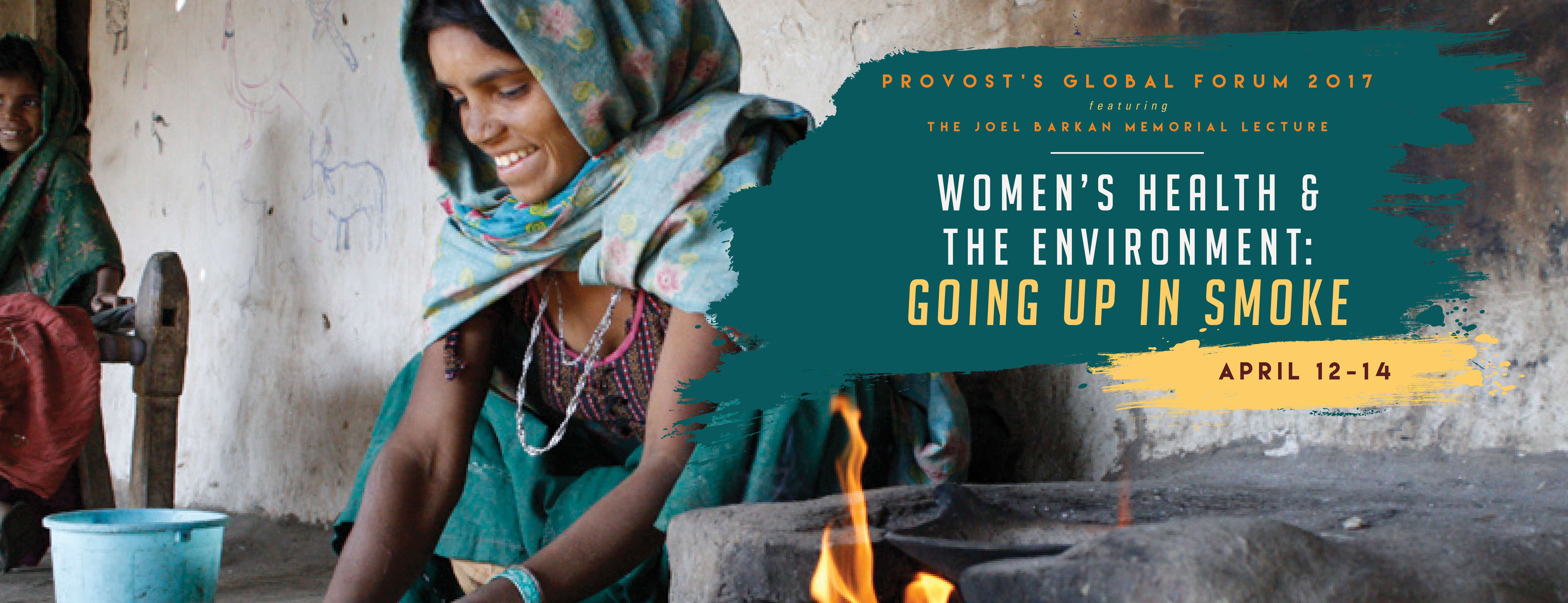
Provost's Global Forum 2016
October 13-15
Cooking with firewood and other biofuels is by many accounts one of the most urgent problems in the world today. The United Nations and Global Alliance for Clean Cookstoves report that about 2.7 billion people in the world depend on traditional cookstoves or open fires fueled by biomass. Traditional cookstoves contribute over 20% of global black carbon emissions. Women and children are disproportionately affected due to their physical proximity to cooking fires. The World Health Organization estimates that more than four million people die annually from indoor air pollution; exposure to traditional cookstoves is the second worst health-risk factor for women and children globally.
The increasing scarcity of firewood in many parts of the world (due to deforestation and privatization) combined with respiratory illness caused by cooking with biomass exemplify the ‘slow violence’ that causes immense harm and death but is not dramatic enough to grab the headlines. And yet, despite the lack of media attention, development professionals and organizations have been researching, designing, and distributing improved cookstoves (identified as efficient, smokeless, or clean) for over four decades. This is a global story, but the narrative is not the same everywhere. This forum will explore the story of traditional wood-burning cookstoves (TWCs) in the global south, and of the many (largely failed) attempts to replace them with improved cookstoves (ICs).
In December 2016-January 2017, forum organizers led UI students and faculty to India in a unique seminar that complements the forum. Funded by a Fulbright-Hays Group Projects Abroad award, the seminar allowed participants to examine cookstoves in all their dimensions: what has motivated efforts to improve them, what interventions have occurred, and why have these efforts tended to fail. Below are some student blogs recounting their experience on the trip:
Shanea's blog: https://shaneawhileaway.wordpress.com/
Emma's blog: https://emmalouabroad.wordpress.com/
Other related media: Why the Quest for Clean Cookstoves in India Is a Women’s Rights Issue
The 2017 Provost's Global Forum, Women’s Health & the Environment: Going Up in Smoke, will focus on several major dimensions of the cookstove problem:
- the global and local costs, and the environmental and personal harms of continued use of TWCs
- the historical, social, cultural, symbolic elements of traditional cooking technology
- the challenges of developing durable, cheap and easy-to-repair ICs
- the social, cultural, economic, political and gender dimensions of technology change around cooking - a very personal and intimate aspect of daily life.
The twin goals of the forum are a) to facilitate conversations among researchers and interested persons working on various dimensions of this issue at diverse global locations, and b) to increase awareness about this global problem on the UI campus and in the broader community across the Midwest.
The forum is made possible through the generous support of the Stanley-UI Foundation Support Organization. Visit our sponsor page for a full list of our campus and community partners.
All events are free and open to the public.
Schedule of Events
WEDNESDAY, APRIL 12
11:00 a.m. - 12:00 p.m. - Joel Barkan Memorial Lecture
Presentation by Gautam Yadama (dean and professor, Boston College School of Social Work)
Senate Chamber, Old Capitol Museum
2:30 - 4:30 p.m. - Display and demonstrations of cookstoves
Anne Cleary Walkway
7:30 – 9:00 p.m. - WorldCanvass: Women's Health and the Environment: Going Up in Smoke
Catered pre-show reception, 6:30-7:30
Voxman School of Music Recital Hall
THURSDAY, APRIL 13
Keynote Presentation - NOTE CHANGE OF TIME AND LOCATION
Kirk Smith, professor of global & environmental health, University of California, Berkeley
10:00 – 12:45 p.m. - Panel I: Carbon, Climate Change and Biomass Use
Senate Chamber, Old Capitol Museum
2:15 - 3:15 - Keynote Presentation - NOTE NEW TIME AND LOCATION
Kirk Smith, professor of global & environmental health, University of California, Berkeley
Pappajohn Business Building, Room W151
2:15 – 5:00 p.m. - Panel II: Global Health Effects of Emissions from Biofuels
Pappajohn Business Building, Room W151
7:30 p.m. Screening of film: "What the Health"
Iowa Memorial Union, Iowa Theater
FRIDAY, APRIL 14
8:15 – 9:00 a.m. - Keynote Presentation - "Impacts of Land Use/Land Cover Change (LULCC) on Atmospheric CO2 and Climate"
Atul Jain, professor, department of atmospheric sciences, University of Illinois
Becker Communication Studies Building, Room #101
9:00 – 12:30 p.m. - Panel III: Policy and Fuel Use in Developing Countries
Becker Communication Studies Building, Room #101
12:30 – 12:45 p.m. - Concluding Comments
Becker Communication Studies Building, Room #101
3:00 - 4:30 p.m. - Panel Discussion: "Writing About Climate Change"
Becker Communication Studies Building, Room #101
Forum Staff
Event Organizers
- Jerry Anthony, Associate Professor of Urban & Regional Planning
- Matthew Hill, Associate Professor of Anthropology
- Meena Khandelwal, Associate Professor of Anthropology and Gender Studies
- Marc Linderman, Associate Professor of Geography
- HS Uday Kumar, Professor of Mechanical Engineering
Media and Public Relations
- Joan Kjaer, WorldCanvass
- Marleen Linares
- Ben Partridge
Events and Project Specialist
Sarolta Petersen
Contacts
Sarolta Petersen
Events and Project Specialist
International Programs
319-335-3862
sarolta-petersen@uiowa.edu
The Provost’s Global Forum is the premier annual event on campus focused on international and global issues. In addition to serving the University of Iowa community broadly, the forum endeavors to build connections between the university and the state of Iowa, and positions the UI as a national node in discussions of global affairs.